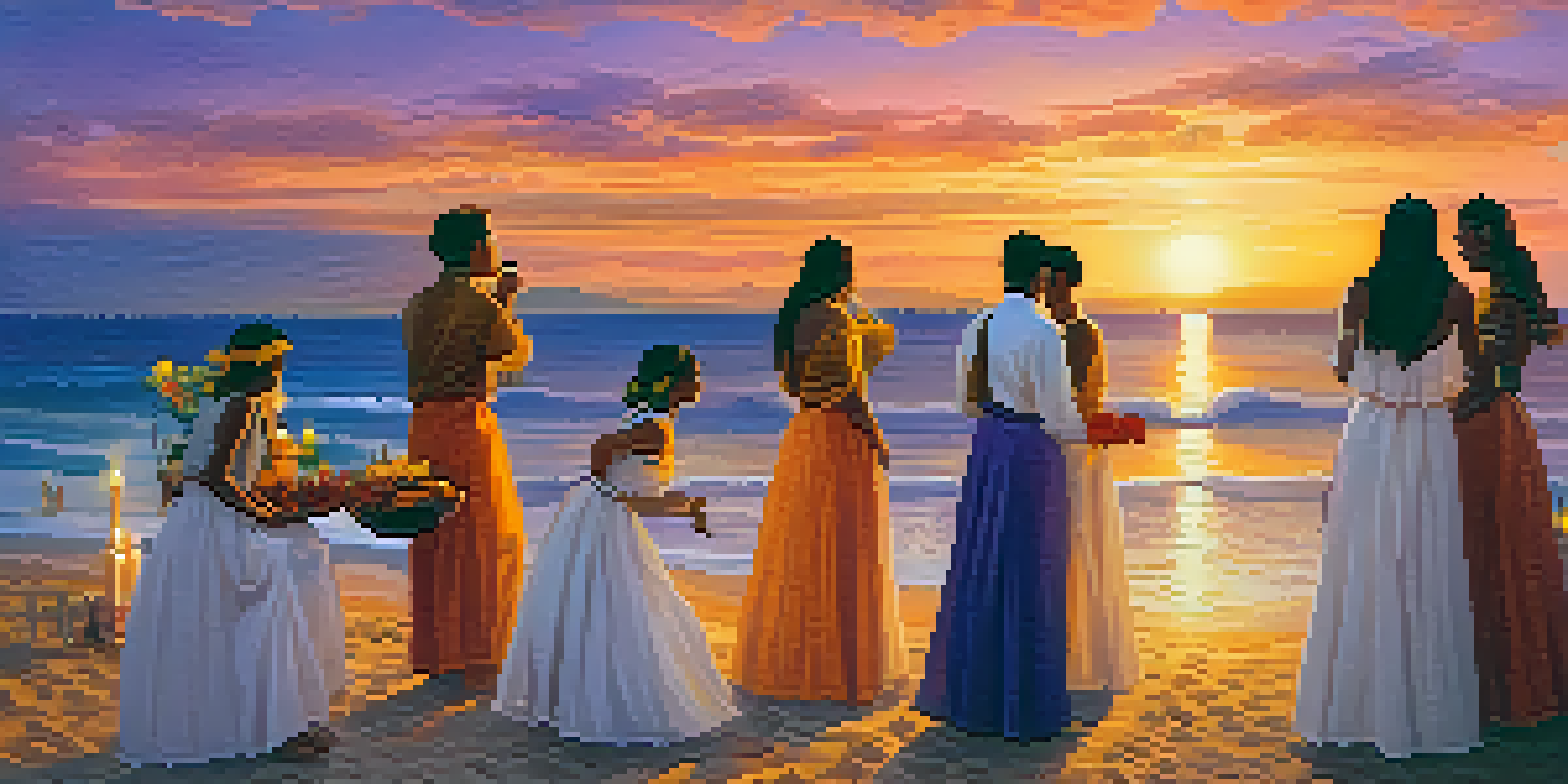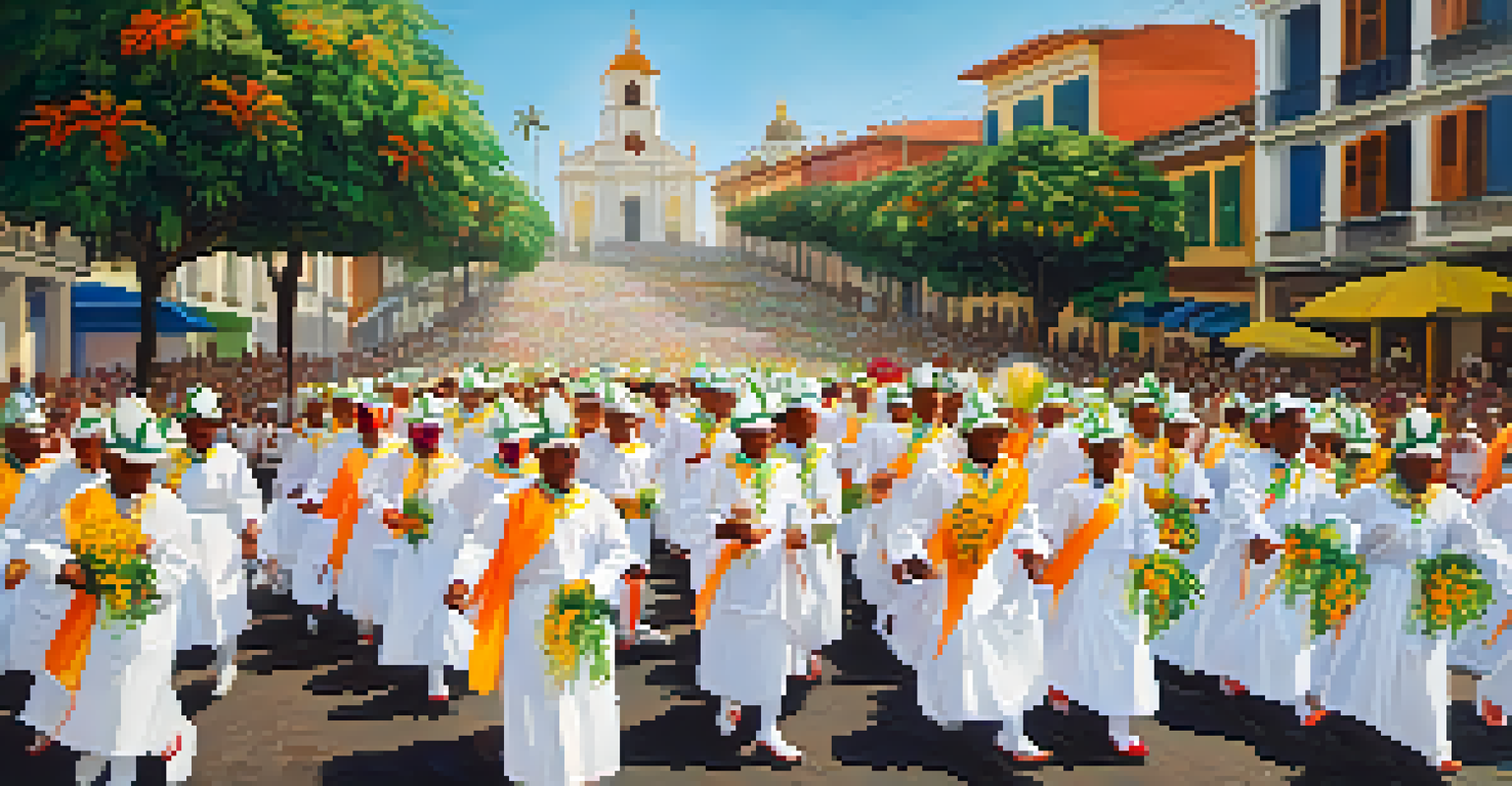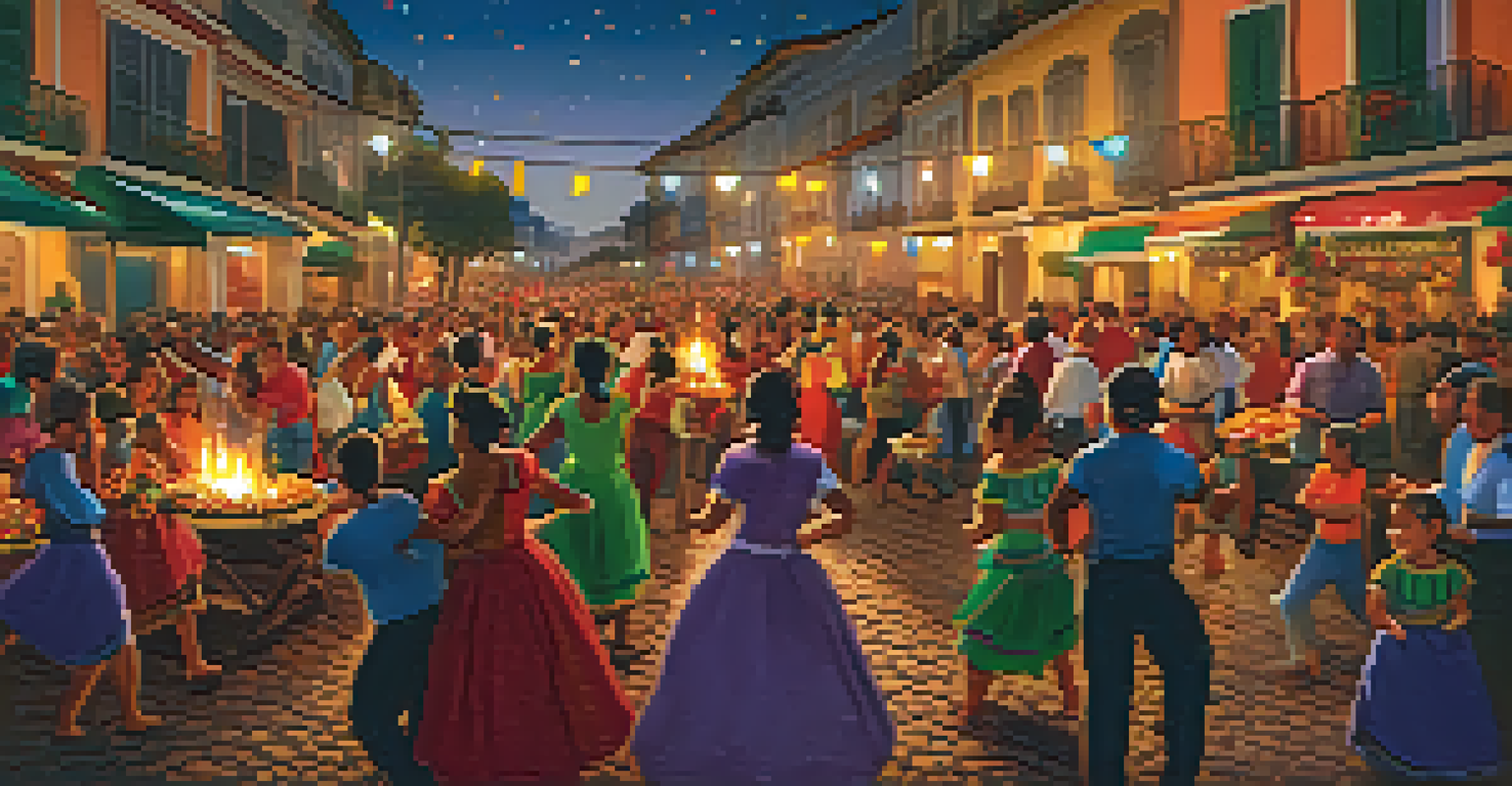Exploring Bahia's Religious Festivals: A Cultural Experience

An Introduction to Bahia's Unique Cultural Landscape
Bahia, a state in northeastern Brazil, is renowned for its rich cultural tapestry woven from African, Indigenous, and European influences. Its religious festivals are a vivid reflection of this blend, showcasing diverse traditions and practices that draw visitors from around the globe. These events offer not just a glimpse into the region's spirituality, but also an opportunity to immerse oneself in its lively music, dance, and culinary delights.
Festivals are a time to come together and celebrate our shared traditions, reminding us of the strength found in community.
As you explore Bahia, you'll quickly realize that religion and culture are intertwined, with festivals serving as a focal point for community gatherings and celebrations. From Catholic processions to Afro-Brazilian rituals, each festival tells a story, celebrating the resilience and creativity of its people. This unique blend of faith and festivity creates an atmosphere that is both joyous and deeply spiritual.
So, whether you're a local or a curious traveler, engaging with Bahia's religious festivals can be a transformative experience, inviting you to delve deeper into the heart of its culture and heritage.
Cultural Significance of Festivals in Bahia
The festivals in Bahia are more than just events; they are a vital expression of the local identity and history. Each festival has its own significance and is often rooted in centuries-old traditions, passed down through generations. For instance, the Festa de Iemanjá, dedicated to the goddess of the sea, draws thousands to the shores of Salvador each February, showcasing the community's profound connection to Afro-Brazilian spirituality.

These celebrations are also a form of resistance and resilience, especially in the face of historical challenges. They provide a platform for expressing cultural pride and preserving unique traditions that might otherwise be lost. In this way, the festivals act as a living museum, offering insight into Bahia's past and the diverse influences that have shaped its present.
Bahia's Festivals Reflect Cultural Richness
The festivals in Bahia showcase a vibrant blend of African, Indigenous, and European traditions, offering insight into the region's identity and history.
Ultimately, attending these festivals offers a sense of belonging, even for visitors. You’ll find that locals are eager to share their customs, inviting you to participate and celebrate alongside them, which fosters a deeper appreciation for the culture.
The Festa de Iemanjá: A Celebration of the Sea Goddess
One of Bahia's most iconic religious festivals is the Festa de Iemanjá, celebrated on February 2nd. This vibrant event honors Iemanjá, the Afro-Brazilian goddess of the sea, who is believed to protect fishermen and ensure safe voyages. The festival transforms the beaches of Salvador into a colorful spectacle of offerings, music, and dance, as thousands gather to pay homage to the goddess.
Cultural heritage is a treasure that we pass down through generations, a living connection to our past.
Participants often dress in white, symbolizing purity, and bring flowers, perfumes, and other gifts to be placed in the ocean. As the sun sets, the atmosphere becomes electric with the sounds of drumming and chanting, creating a spiritual connection among all those present. This deeply communal experience not only honors Iemanjá but also reinforces the bonds of local culture and tradition.
For visitors, witnessing the Festa de Iemanjá is nothing short of magical. It's a chance to connect with the local community, experience authentic traditions, and understand the significance of the sea in Bahia's cultural landscape.
Lavagem do Bonfim: A Colorful Procession of Faith
Another major event in Bahia is the Lavagem do Bonfim, held every January in honor of Senhor do Bonfim, the patron saint of Bahia. This unique festival features a vibrant procession from the Igreja de São Joaquim to the Basílica do Senhor do Bonfim, where participants wash the church steps with scented water, symbolizing purification and renewal. It is a sight to behold, with thousands dressed in traditional white attire, creating a sea of color and devotion.
The atmosphere is filled with music, dancing, and joy, as locals and tourists alike join in the festivities. The procession is not just a religious act; it is a celebration of community, culture, and shared beliefs. Traditional music, including samba and axé, fills the air, reflecting Bahia's rich musical heritage.
Community and Connection Through Celebration
Engaging in Bahia's festivals fosters a sense of belonging, inviting both locals and visitors to share in the cultural pride and traditions.
For those attending for the first time, the Lavagem do Bonfim is an invitation to participate in a unique expression of faith and togetherness. It's a reminder of the power of community and the importance of honoring one's roots.
Festa de São João: A Mid-Year Celebration of Tradition
As the calendar turns to June, Bahia comes alive with the Festa de São João, a festival that celebrates the harvest season and traditional rural life. The festivities are characterized by lively music, traditional dances like quadrilha, and an array of delicious local foods, including corn-based dishes that are a hallmark of this celebration. São João is not just a religious event; it merges the sacred with the secular, creating a festive atmosphere that captivates all who participate.
Throughout the month, towns and cities host bonfires, street parties, and music performances. The vibrant energy and sense of community are palpable, as people gather to dance and celebrate together. This festival also highlights Bahia's agricultural roots, emphasizing the importance of the land and the bounty it provides.
Visitors can immerse themselves in the local culture by joining in the dances, sampling traditional foods, and experiencing the warm hospitality of Bahian people. The Festa de São João truly encapsulates the spirit of Bahia, blending tradition, faith, and community in a joyous celebration.
The Role of Music and Dance in Religious Festivals
Music and dance are integral components of Bahia's religious festivals, serving as powerful expressions of cultural identity and spiritual connection. From the rhythmic beats of the drums to the graceful movements of dancers, these art forms bring the festivals to life and invite participation from everyone present. Traditional genres like samba, axé, and forró resonate throughout the celebrations, creating an infectious energy that draws people in.
During the festivals, musicians often play live music, and dancers take to the streets, encouraging spectators to join in. This communal aspect fosters a sense of unity and celebration, where everyone can contribute to the vibrancy of the event. It's not uncommon to see locals inviting visitors to dance, share stories, and celebrate together, thus breaking down barriers and creating lasting memories.
Music and Dance Unite Festival Goers
Music and dance play a vital role in Bahia's festivals, creating an energetic atmosphere that encourages participation and storytelling.
By experiencing the music and dance at these festivals, attendees gain a deeper appreciation for Bahia's cultural richness. These elements not only entertain but also serve as a means of storytelling, passing down history and traditions from one generation to the next.
Conclusion: Embracing Bahia's Cultural Richness
Exploring Bahia's religious festivals is more than just attending events; it's about embracing the rich cultural heritage that defines this vibrant region. Each festival offers a unique glimpse into the local community's values, beliefs, and traditions, inviting you to experience the warmth and hospitality of Bahian culture. From Iemanjá's offerings to the lively celebrations of São João, there's something for everyone to enjoy.
As you wander through the colorful streets filled with music, dance, and delicious food, you’ll find that these festivals are a celebration of life itself. They remind us of the importance of community, faith, and the rich tapestry of experiences that shape our identities. Engaging with these events can foster a deeper understanding and appreciation for the diversity that exists in our world.

So, whether you're planning a trip to Bahia or simply curious about its cultural landscape, take the time to explore its religious festivals. You'll not only witness vibrant celebrations but also connect with the heart and soul of Bahia, leaving you with unforgettable memories and a newfound appreciation for this beautiful region.